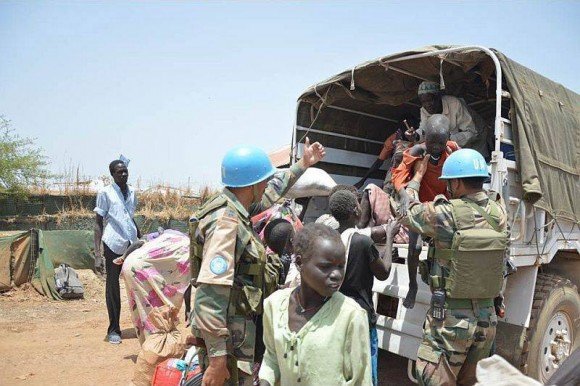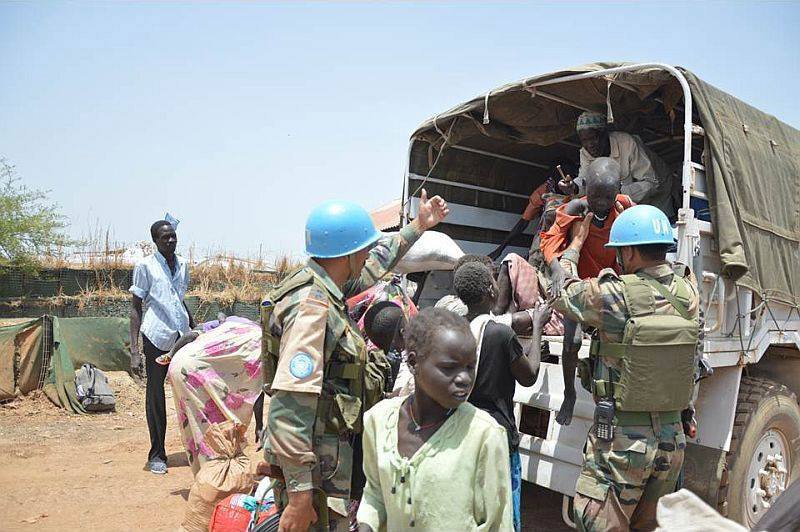Literature
Indian peacekeepers facing greater risks in South Sudan

United Nations, July 9
Escalating tensions in
South Sudan are bringing the civil war to the doorstep of Indian
peacekeepers, putting them at increased risk while the UN is unable to
broker a peace between the young nation's warring sides or restrain
them.
With over 2,000 Indian troops serving in the UN Mission in
South Sudan (UNMISS), the heightened tensions have raised the Indian
government's concerns for their safety after a recent attack on a
refugee camp where Indian peacekeepers are stationed for protecting
civilians.
India's Permanent Representative Asoke Kumar Mukerji
has in recent days taken up the deteriorating situation in that country
with top UN Secretariat officials, as well as with the members of the UN
Security Council who deal with this issue directly.
He has
warned of the rising risks to the peacekeepers and reiterated his call
for more vigorous efforts to find a political solution to the problem
there.
South Sudan, which observes Thursday the fourth
anniversary of its independence from Sudan, is in the throes of a civil
war between supporters of the two rival leaders, President Salva Kiir
Mayardit and former vice president Riek Machar.
A source familiar
with the field situation told IANS on Wednesday that peacekeepers have
been placed on high alert and staff members have been advised to
restrict their movement after a rebel attack on a refugee camp guarded
by 800 Indian troops in Malakal in the Upper Nile state killed a refugee
and wounded six others. The injured were being treated at the Indian
peacekeepers' hospital and one of them was in a critical condition, the
source added.
The attack on July 1 was carried out by the South
Sudan rebels led by Major General Johnson Olony, who defected from
Kiir's side to Machar's, according to the Intergovernmental Authority on
Development (IGAD), a grouping of East African nations charged with
holding peace negotiations in South Sudan. The rebel army is known as
Sudan People's Liberation Army in Opposition/Olony (SPLA-IO/Olony).
Highlighting
the risk of the peacekeeping operation turning into an armed
confrontation when UN troops come under attack by the warring sides, the
source said peacekeepers from an African country at the refugee camp
fired back, bruising the shoulder of a SPLA-IO/Olony soldier.
UN
troops intercepted the attackers but 15 others rushed to their rescue
and peacekeepers freed them in order to de-escalate the standoff, the
source said.
In May, an Indian Army colonel was injured in crossfire between two warring groups in Malakal.
On
Monday, there were more reports of belligerent actions in the area of
the Malakal camp. UN Secretary-General Ban Ki-moon's deputy spokesperson
Farhan Haq told reporters that 400 troops of the Sudan People's
Liberation Army, which is loyal to Kiir drove past the UNMISS Malakal
compound on Monday morning with tanks and armoured personnel carriers.
This followed reports of three mortar rounds fired towards Malakal town.
Detailing
the toll of the civil war, Ban said Wednesday: "More than 1.6 million
people have been displaced, including over 150,000 now seeking refuge in
UNMISS protection sites. Some 4.6 million face severe food insecurity
and over 600,000 have been forced to flee into neighbouring countries."
In
the years since South Sudan's independence, the UN has changed the
focus of UNMISS mission to primarily protecting civilians who have
become internal refugees.
Although UNMISS asserts that any attack
on a protection-of-civilians site may constitute a war crime, the UN
has done little to enforce international law or stop the civil war.
Earlier
this month, the UN Security Council imposed sanctions on six South
Sudanese generals, three from either side, banning their travel and
freezing their assets. A diplomat here dismissed it as mere tokenism
because it did not affect the top leaderships.
Herve Ladsous, the
under secretary-general for peacekeeping operations, on Wednesday
called for sanctions against more leaders and an arms embargo. One of
the factors limiting IGAD's peace efforts is that one of its members,
Uganda, is itself a supplier of weapons to Kiir.








































